Blog Archives
Do You Believe In Miracles — Medical Miracles?
Introduction by Bob Aronson
Since Bob’s Newheart began publishing on WordPress over seven years ago, we have tried to offer encouragement, sound medical information, choices for healthy living, news of what’s to come and as much inspiration as possible for those who suffer from debilitating diseases. As a heart transplant recipient I know what its like to feel desperate and without hope. I also know there is always hope, always.
Dr. Priscilla Diffie-Couch and her sister Dawn Anita Plumlee have been contributors to our inspiration series in the past. Today Dr. Diffie-Couch returns with the amazing story of how she suvived what could have been — what should have been–
a deadly cancer.
MY PERSONAL MEDICAL MIRACLE
Priscilla Diffie-Couch ED.D.
Friday morning I awake relieved. My doctor has pronounced my ulcer completely healed. I return from my errands humming happily and stop to check my message machine. Why has my doctor’s office tried three times to reach me? I already know the good news. Now I have my doctor on the phone and listen to his strange tight voice. 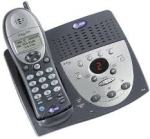
“We need to repeat your biopsy. I’m afraid it looks suspicious.”
“Suspicious?” Characters in murder mysteries look suspicious. People lurking in dark alleys look suspicious. My biopsy looks suspicious?
“How suspicious?” I ask cautiously.
“Highly suspicious?”
“You mean, as in malignant?”
“Well…yes.”
“So are we talking cancer in my stomach?”
“Yes. I’m afraid so.”
“The prognosis if that’s true?”
“Not very good, I’m afraid.”
He’s afraid? I’m trembling with fear. We settle the details for another more extensive biopsy. I call my husband Mickey. Probably a mix-up, we agree–someone else’s tissue. My friend Donna, who happens to be a pathologist calls. Her voice too is strained. Having reviewed my biopsy, she and her pathologist husband Dee appear after work with two bottles of their best wine. We toast to a “mistake in the lab.” And feel for the real owner of the suspicious biopsy tissue because the samples they both examined were literally cluttered with countless cancer cells.
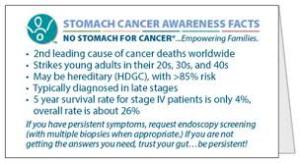 Saturday begins with a long close silent hug. If the biopsy tissue truly is mine and I have cancer, we need to be informed. We head for the medical books in the huge used book store. We go from there to the library. We read in silence–page after page of gloom and doom. It is a deadly disease. Statistics point to a 10% survival rate for victims of stomach cancer. Pictures of my grieving family flash through my mind as the tears well up in my eyes.
Saturday begins with a long close silent hug. If the biopsy tissue truly is mine and I have cancer, we need to be informed. We head for the medical books in the huge used book store. We go from there to the library. We read in silence–page after page of gloom and doom. It is a deadly disease. Statistics point to a 10% survival rate for victims of stomach cancer. Pictures of my grieving family flash through my mind as the tears well up in my eyes.
Another sustained quiet hug when we get home. I break away suddenly and declare that the statistics are on our side. If ten percent of the people beat this cancer, that will include me, so my chances then become one hundred percent. That is how we will present the news to family. That is optimistic but believable, given my general good health and fighting spirit.
Sunday Mickey calls family members. My son Jeff and his wife Diana arrive shortly to share our outlook of a hundred percent chance of survival. My sister tells me to get a copy of Bernie Siegel’s Love, Medicine and Miracles, which I vow to do immediately. Later that evening Mickey and easily win our mixed doubles tennis match. I begin reading the book my sister suggested. The seeds for positive thinking are being planted as I do.
On Monday I undergo what is called a D & C for a feminine bleeding problem also related to cancer and set a tentative schedule for full removal of my stomach on Thursday, should these suspicious cancer cells truly be mine. They are. Donna and Dee deliver that dreaded news. They know the grim outlook for stomach cancer. Shattering silence. I say something funny. I must have. We all burst out laughing. I can feel a change in the climate. I can see they are now on board as believers in my chances of survival.
On Tuesday I spell out my situation to my friend Sharon, who recently sold her share in Sound Warehouse for $46 million dollars. Upon arrival at my doorstep, she declares with authority that she is “here to insure that I have the best medical care that money can buy.” The doorbell rings again. Cissy. Nancy. Charlene. Margie. All bearing gifts–elegant gowns. I may end up without a stomach but I will be the most beautifully dressed patient in the cancer ward. We laugh at my concern about bleeding all over the operating table since the D & C didn’t arrest my flow. We women are commonly such vain creatures. But good friends like these are rare indeed.
The healing process begins the moment the diagnosis is confirmed with a third biopsy. As I look at Mickey, his shoulders shaking with stifled sobs—a weak moment of looking ahead at life without me—he apologies. Suddenly my role in this ordeal becomes clear.
When faced with your own mortality, your primary concern becomes protecting those who love you from all possible pain. It is not a matter of bravery. It is just a matter of loving that deeply. Mickey and I share an uncommon love. We have overcome enormous obstacles and built a history o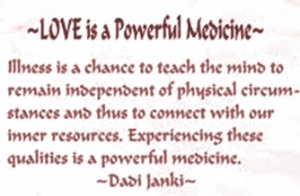 f disproving fatalistic predictions. I have developed an extraordinary closeness with his family. My own family fills my life with indescribably intense feelings. They have known the never-ending anguish of losing Mom to a drunk driver. They don’t deserve to deal with another untimely death. I cannot let any of them suffer. So the smile on my face is not an act. It is an act of love prompted by a genuinely selfish need to be there with them to share whatever memorable moments await us all.
f disproving fatalistic predictions. I have developed an extraordinary closeness with his family. My own family fills my life with indescribably intense feelings. They have known the never-ending anguish of losing Mom to a drunk driver. They don’t deserve to deal with another untimely death. I cannot let any of them suffer. So the smile on my face is not an act. It is an act of love prompted by a genuinely selfish need to be there with them to share whatever memorable moments await us all.
Donna and Dee have already made certain that I will have the best cancer surgeon in the area. The chairman of Fina Oil, where Mickey works as a VP, vows to see that I receive VIP treat at the best cancer treatment center available. I have too many people determined that I will be among the survivors. I cannot let them down.
I arrange for pictures of all my family to surround me when I come out of surgery. Sitting up on my knees on the gurney, wondering why I can’t trot down the hall to the OR, I smile at my family’s faces and remind them not to have too much fun for the next five hours. The last thing I remember is Mickey’s hand holding mine as I am wheeled away. I am still smiling.
Sometime during those next five hours, I lose my sense of humor. I am groggy but aware and can hear my plaintive plea: “Pain. Pain. Pain.” I can faintly make out the images above me—my 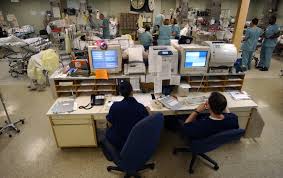 husband, son, daughter-in-law. They watch as I am transported to ICU. The next morning I am sure my scream shatters the glass window when two huge orderlies toss me onto the waiting gurney. “Don’t—you—touch—me—again—without—a—member—of—my–family—present.” They step back and are surprised when I pull myself from the gurney to the bed in my room. My daughter, worlds away from me in lifestyle and philosophy—will stay with me the next ten days. I watch with wonder as she handpicks the most attentive and caring staff of nurses anyone could hope for and begins to line out the plan for my care.
husband, son, daughter-in-law. They watch as I am transported to ICU. The next morning I am sure my scream shatters the glass window when two huge orderlies toss me onto the waiting gurney. “Don’t—you—touch—me—again—without—a—member—of—my–family—present.” They step back and are surprised when I pull myself from the gurney to the bed in my room. My daughter, worlds away from me in lifestyle and philosophy—will stay with me the next ten days. I watch with wonder as she handpicks the most attentive and caring staff of nurses anyone could hope for and begins to line out the plan for my care.
My gastroenterologist drops by and asks if I mind being a “teaching subject” since mine is such an unusual case. I eagerly agree, glad to be a part of advancing medical science. He is joined by my pathologist friend Donna, who announces that my stomach was totally clear of cancer save a tiny millimeter located at the top. Leaving even a small part of my stomach will be too risky I am told. “Yours must be the earliest case of stomach cancer ever diagnosed,” she declares. How could my stomach, so full of cancer five days ago, be almost totally free of it now? No one tries to explain that but I would later discover other equally rare and miraculous instances of spontaneous remission.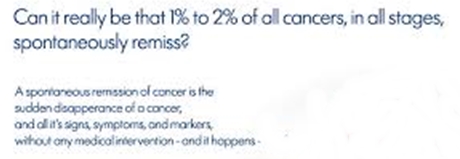 My body was eradicating the cancer by itself.
My body was eradicating the cancer by itself.
My cancer surgeon tells me he will construct a pouch from a piece of my large intestine that will serve as my stomach. (I am eating a small portion of sugar-free Jello as he describes this phenomenal feat. I smile as I recall a passage from humorist Dave Berry’s delightful book Stay Fit and Healthy Until You Are Dead in which he claims that our skin is the most important of our vital organs, because without it, all the disgusting hideous inner parts of us would fall out onto the sidewalk for all manner of people to trip over.
“Ok, Mother,” my daughter beams brightly at 7:00am (she who has never knowingly arisen before noon any day in her life since she ran away from home). “Up we go now. We have our goals for the day.” First, soap bubbles so thick I have little peep holes for eyes, the triple scrub, a quick shave under the arms, a little talcum powder here and there, and lots of lotion everywhere. Maneuvering seamlessly around all the wires and tubes, she is making sure every inch of me will be supremely soft and supple.
In and out of my morphine mind, I make a list of questions for her to ask my cancer surgeon, should I be asleep when he drops in. I can hear him now whistling cheerfully down the hallway. I emulate his demeanor as I am trying for the perfect-patient-of-the-ward award. That shouldn’t be difficult since I am surrounded by the most efficient medical staff in America.
I feel for those people who hear the word cancer and drop into a deep and unalterable depression. With the constant arrival of guests, flowers, gifts and cards, I am not likely to let my spirits sag. I am already writing thank you notes in my mind. And they seem so inadequate when I think of the how everyone continues to buoy my spirits in so many countless ways.
Flitting around my hospital room, I accidentally pull out the feeding tube that was implanted in my side to insure my nourishment should my new “stomach” fail in some way. I will be fine, I tell myself. (I later learn that this little set-back will have a serious impact on my recovery.)
Following the highly regimented eating plan the first few weeks at home is not working. Revulsion and nausea are my constant companions. One day, as I step out of the bath tub, I glance up at the bank of mirrors I have so carefully avoided. I gasp. Looking back at me is the image of a captive in a concentration camp. My skin clings to my bones. My eyes are buried deep in their sockets. I have gone too long without sufficient nourishment.
I call a friend who listens to my plight and reports that she knows someone who stopped his weight loss with Ensure, a repulsive high-calorie sickeningly sweet shake. I have no choice. Slowly, I begin to restore my lost pounds.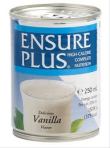
This morning I am awakened by my loving husband who has been sleeping elsewhere, partly because of his cold and partly because I have to sleep upright to keep bile from coming into my throat. “It’s time to get out and see what’s happening in the rest of the world. We are going to Jeff’s weightlifting meet.” I smile. Life is full. Life is good. I’m still in it.
A quarter of a century later, I am still in it. I beat the odds and way beyond. In 2005 two doctors from Australia were awarded the Nobel Prize in medicine for their discovery that the bacteria H-Pylori causes almost 90% of gastric ulcers and these can lead to stomach cancer. The actual date of their discovery was three years before my ulcer appeared in 1988. But one study shows that it can take as many as seventeen years before American doctors adapt new medical discoveries into their practice. That means that we must all do diligent research on the nature of and treatment for our own medical conditions. As late as 1999, still at risk for a new cancer in my intestine, I could not find a gastroenterologist who would test me for H-Pylori. It was my family doctor, an osteopath, who did so and prescribed the two-week treatment of triple antibiotics that could have saved my stomach in 1989.
I still face challenges associated with having no stomach. Battling the bile that comes up from my liver makes getting good sleep an elusive dream. Ballooning up when my colon locks up brings on birthing-like pain. Staying hydrated to avoid arrhythmia remains a struggle. But trips to the ER are increasingly rare and sublingual B-12 has replaced those dreaded self-administered shots.  I can now say with conviction that I am an active healthy survivor who has much to be thankful for. I credit my friends for their devotion and for referring me to the gastroenterologist who was thorough enough to biopsy my healed ulcer. I credit him and the talented surgeon who constructed a replacement “stomach” that has worked so flawlessly all these years. When diagnosed with stomach cancer, most people are dead within five years. So, many call my case a medical miracle.
I can now say with conviction that I am an active healthy survivor who has much to be thankful for. I credit my friends for their devotion and for referring me to the gastroenterologist who was thorough enough to biopsy my healed ulcer. I credit him and the talented surgeon who constructed a replacement “stomach” that has worked so flawlessly all these years. When diagnosed with stomach cancer, most people are dead within five years. So, many call my case a medical miracle.
I remain dubious about a beneficent god who would opt to save me while letting more deserving people die. I am more open to the possibility that having a positive spirit causes the body to pump out protective agents yet to be identified. I don’t pretend to be able to explain medical miracles but I am deeply thankful–for the sake of those who care–that one happened to me.
-0-
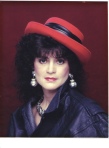 An award winning high school speech and English teacher, Priscilla Diffie-Couch went on to get her ED.D. from Oklahoma State University, where she taught speech followed by two years with the faculty of communication at the University of Tulsa. In her consulting business later in Dallas, she designed and conducted seminars in organizational and group communication.
An award winning high school speech and English teacher, Priscilla Diffie-Couch went on to get her ED.D. from Oklahoma State University, where she taught speech followed by two years with the faculty of communication at the University of Tulsa. In her consulting business later in Dallas, she designed and conducted seminars in organizational and group communication.
An avid tennis player, she has spent the last twenty years researching and reporting on health for family and friends. She has two children, four grandchildren and lives with her husband Mickey in The Woodlands, Texas.
-0-
Bob Aronson has worked as a broadcast journalist, Minnesota Governor’s Communications Director and for 25 years led his own company as an international communication consultant 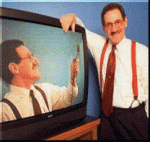 specializing in health care.
specializing in health care.
In 2007 he had a heart transplant at the Mayo Clinic in Jacksonville, Florida. He is the Bob of Bob’s Newheart and the author of most of the nearly 250 posts on this site. He is also the founder of Facebook’s nearly 4,000 member Organ Transplant Initiative (OTI) support group.
You may comment in the space provided or email your thoughts to him at bob@baronson.org. And – please spread the word about the immediate need for more organ donors. There is nothing you can do that is of greater importance. If you convince one person to be an organ and tissue donor you may save or positively affect over 60 lives. Some of those lives may be people you know and love.
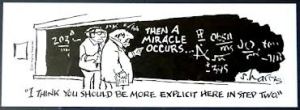
You must be logged in to post a comment.